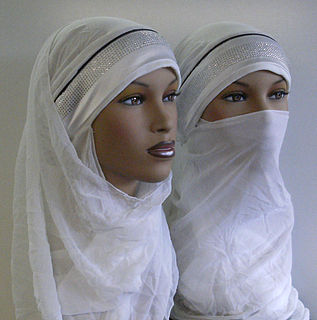 W
WIn Islamic legal terminology, bāligh or mukallāf or muhallāq or murāhiq or muhtalim refers to someone who has reached maturity or puberty, and has full responsibility under Islamic law.
 W
WGender segregation in Islamic law, custom, law and traditions refers to the practices and requirements in Islamic countries and communities for the separation of men and boys from women and girls in social and other settings. Scholars differ as to whether the Qur'an requires gender segregation, and, if so, the hadith that require it. There are diverging opinions among experts in Islamic theology concerning gender segregation.
 W
WHaya is an Arabic word that means "natural or inherent, shyness and a sense of modesty". In Islamic terminology, it is mainly used in the context of modesty. The word itself is derived from the word Hayat, which means "life". The original meaning of Haya refers to "a bad or uneasy feeling accompanied by embarrassment". Haya encourages Muslims to avoid anything considered to be distasteful or abominable. Haya plays an important role in Islam, as it is one of the most important parts of Iman. The antonym of Haya in Arabic is badha'a or fahisha.
 W
WA hijab is a veil worn by many Muslim women in the presence of any male outside of their immediate family, which usually covers the hair, head and chest. Another interpretation can also refer to the seclusion of women from men in the public sphere, whereas a metaphysical dimension, may refer to "the veil which separates man, or the world, from God".
 W
WThe intimate parts of the human body which must, according to Islam, be covered by clothing. Exposing the intimate parts of the body is unlawful in Islam as the Quran instructs the covering of male and female genitals, and for adult females the breasts. Exposing them is normally considered sinful. Exposing intimate parts when needed, such as going to the toilet or bathing, falls under a specific set of rules. Precisely which body parts must be covered varies between different schools of Islamic thought.
 W
WIslamic sexual jurisprudence is a part of family, marital, hygienical and criminal jurisprudence of Islam that concerns the laws of sexuality in Islam, as largely predicated on the Quran, the sayings of Muhammad (hadith) and the rulings of religious leaders (fatwa) confining sexual activity to marital relationships between men and women. While most traditions discourage celibacy, all encourage strict chastity, modesty and privacy with regard to any relationships between genders, holding forth that their intimacy as perceived within Islam is largely reserved for marriage. This sensitivity to gender difference, gender seclusion and modesty outside of marriage can be seen in current prominent aspects of Islam, such as interpretations of Islamic dress and degrees of gender segregation.
 W
WIn Islam, a mahram is a member of one's family with whom marriage would be considered haram ; from whom purdah, or concealment of the body with hijab, is not obligatory; and with whom, if he is an adult male, she may be escorted during a journey, although an escort may not be obligatory.
 W
WA niqāb or niqaab, also called a ruband, is a garment that covers the face, worn by some Muslim women as a part of an interpretation of hijab. The terms niqab and burqa are often confused; a niqab covers the face while leaving the eyes uncovered, while a burqa covers the entire body from the top of the head to the ground, with only a mesh screen allowing the wearer to see in front of her. According to the majority of Muslim scholars and Islamic schools of thought, face veiling is not a requirement of Islam; however a minority of Muslim scholars, particularly among the Sunni Salafi and Wahhabism movement, assert that women are required to cover their faces in public. Those Muslim women who wear the niqab, do so in places where they may encounter non-mahram (un-related) men.